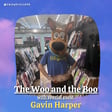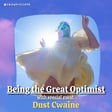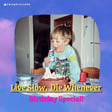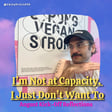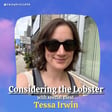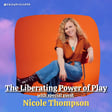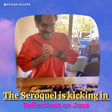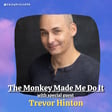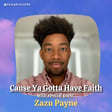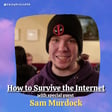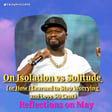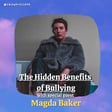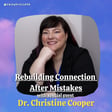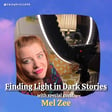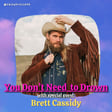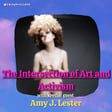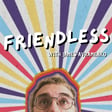Introduction and Themes of Friendship
00:00:08
Speaker
Well, hey there sweet peas, welcome back Friendless. I'm your host James Avromago, back once again to ask what it means to be a good friend and how can we be more effective members of our community. This week I had the absolute pleasure to chat with the one, the only, Dean Spade.
00:00:24
Speaker
Dean, amongst other things, is the author of the new book Love in a Fucked Up World, and we got a chance to talk real deep about topics of liberation, community, and what it truly means to be present in this current chaotic world.
00:00:37
Speaker
All that and so much more. So now it's time to lean back, get comfy, set your volume at a reasonable level, and enjoy my interview with Dean Spade here on Friendless.
Dean Spade's Background and New Book
00:00:48
Speaker
This week on Friendless, I have ah someone who ah has been has been talking to me ah pretty steadily for the last couple of weeks, but we just met for the first time just a few moments ago.
00:01:00
Speaker
um He is, um amongst a myriad of other things, a lawyer, a writer, an activist. um ah the Currently the the the author of the brand new book, Love in a Fucked Up World, which ah for the last week I've been called calling love is a fucked up word.
00:01:17
Speaker
But ah the one and the only Dean fucking Spade, how are you
Presence and Joy Amidst Chaos
00:01:22
Speaker
today? I'm so glad to be here with you. I love your enthusiasm. I really believe in enthusiasm. we really need it right now.
00:01:29
Speaker
We really do. you know, honestly, thank you for saying that because it is something that i you know, I feel most kind of, I guess, um you could almost call it authentic when I'm just like kind of got that.
00:01:41
Speaker
Labrador energy, you know, when I'm just like, oh, I'm into this, let's meet it. And and it sometimes feels inappropriate in the kind of context of the greater world, you know, of everything that's going on and the weight of everything that's happening. But I've, especially the last few months, I've been like, no, no, no.
00:01:57
Speaker
That's necessary. That's the counterbalance. Like why else would we be fighting for this stuff if not for joy and pleasure and all these things? And also because like we want people to join us. So we got to make it look fun. got to bring like excited spirits to things and be like, yeah, like let's at least we'll enjoy each other while we fight this stuff. At least we'll care for each other.
00:02:17
Speaker
Let's do hard things together. Let's do boring things together that need yeah to get done to people be well. big but Exactly. Exactly. um So before we really launch into it, I've got so many questions for you. i have prepared a whole list we won't get to, but I was just, I was just so nervous about this interview.
00:02:35
Speaker
But to get things really rolling, I'll ask the same question I ask all, all my, all my guests, despite my little preamble to you, who the hell are you?
00:02:45
Speaker
um That's a great question. um I mean, what, To me, that asks me like what my life is about. um My life is about liberation. um that I've spent the last 25 years or so in social movements, you know ah queer and trans liberation, abolition of police prisons and borders, stuff against wars, Palestine solidarity stuff.
00:03:10
Speaker
I'm asking the question, what actually makes change happen? What are obstacles to it? What are the lies we've all been told about how change happens that then get in the way? And so asking those questions about movements, asking those questions about the groups we're in that movements are made of, like the projects, the collaborations, the efforts, and also asking those questions within myself.
00:03:29
Speaker
Like for me, liberation personally is like being with reality and being able to be responsive to what's happening now instead of being lost in like, cultural illusions or stuck in my own past. So I can't tell what's really happening here with you now.
00:03:45
Speaker
So I'm interested in us having movements that can actually respond to the current crises, which I think are quite profound and, you know, extinction level. And I'm interested in personally being as responsive as I can to the conditions around me and to the people and, you know, that i'm in environments that I'm actually engaging with and,
00:04:04
Speaker
doing whatever I can to reduce suffering and attack the infrastructure of like the ecocidal maniacs that run everything.
Grounding in Reality vs. Perception
00:04:12
Speaker
this Couldn't have said it better myself. you know You know, you twigged on something that that um that really sparked my interest is this idea of the of reality and being present within the you know what you are with in the moment rather than allowing sort of perceptions to color, whether it's the past or the future.
00:04:30
Speaker
um and And I'm really curious. um This is actually taking a whole new strand that I was planning, but I'm curious, how do you find yourself kind of grounding yourself in your reality and what kind of practices do you go about doing that to anchor yourself there um and to and to sort of parse out, you know, what is real versus what is the story?
00:04:53
Speaker
Yeah. I mean, on the one hand, I know we can never fully do that. And on the other hand, you know, we're living through our cultural perceptions, the moments where and I'm a person who lived in my time so hardcore. You can just really see it.
00:05:03
Speaker
I really feel that when I regret my prior, like prior efforts I've made. And i'm like, well, I was a person who was living in that time. So that's why we've all been 20, you know? Yeah, exactly. Exactly. And we've all been in 2008 or 2000, whatever. 1999. I, I, but I think that what that really means to me is two levels.
00:05:22
Speaker
One is I spend my life studying as much as I can about what the conditions actually are right now. Like, what are the people in the worst situations really living through? What are the systems that tell us they are here to keep us safe actually do?
00:05:33
Speaker
um What have people done to fight them before? What are people doing now all over the world? Like just those questions that kind of like deep study of the current conditions of domination and the efforts to undo them is about constantly peeling back layers of like, oh, there's another way that liberalism is inside me and altering my thinking, or there's another way that white supremacy is structuring x or Y. So that part of it. And then on the really like interpersonal level,
00:06:03
Speaker
being really open to and interested in giving and receiving feedback with people in an honest way, which is totally counter-cultural in a culture like ours, like actually trying to become someone who can hear people give me feedback and, and really try to assess like what parts of that were grounded. How can I take that away? And can I share feedback? Even though i think most of us talk ourselves out of sharing feedback and therefore like our relationships become like very thin and fragile.
00:06:26
Speaker
And then on the very like solitude level, I have spent a lot of time in, silent
Meditation and Self-awareness
00:06:31
Speaker
meditation retreats. Honestly, like I have to go to that tool regularly in order to learn more about how to see what my responsive patterns are.
00:06:43
Speaker
Like, what are the, thing what are my autopilots? Like what, what comes up again and again? Cause when I'm going through my day and doing it, I don't notice it. I'm just, I'm just living out the reaction and thinking that's reality and thinking that that's who I am instead of when I stop and, um,
00:06:58
Speaker
try to just observe what's going on inside me, I find out there's all these patterned responses that actually aren't me. They're just patterned responses. and And I think that like a key thing about liberation practice is can I have that millimeter of different distance where I know I'm having a feeling or reaction, and I don't try to kill it or think that it's bad. I just know I'm having it.
00:07:19
Speaker
And that might mean I don't automatically play it all out against you or myself. Or if I do, I might be able to recognize that and apologize I hear about the impact. like just like Just practicing for that slight awareness is a lot of what they'll like practice the daily practice looks that's magic you know it's it's funny my my therapist always loves to say awareness is half the battle right you know yeah just just just even being aware even if you just keep on playing through the cycles at least you ah you're not going on auto autopilot with it yes you know and at first it can be frustrating i think a lot of people when they go especially when they first go to therapy or when they start doing meditation or something and or or just when they start to notice god i keep having the same fight with a friend i keep having the same love relationship keep getting the same problems at my jobs or school they can just be like
00:08:05
Speaker
I'm I suck. I'm like, I'm so bored of myself or I tried to fix it, but I found myself in the same situation. And so it's got to be this kind of gentle long journey. You can be like, oh, I thought I stopped like dating active alcoholics who treat me like this. Oh, and here we are 10 years later and I just started another one. yeah like We can all just like, or I thought I stopped like saying yes to my family when I really mean no or whatever.
00:08:27
Speaker
And just being like, how can we be like, wow, this you know this is the deck of hands this is the deck of cards I was dealt in this life. I'm probably going to keep engaging with these patterns and instead of being like i'll know i'm okay when i'm totally fixed or some other capitalist fantasy it's instead like did i bounce back faster i keep connection through the conflict um did did that cycle take less less time like did i did i get into that relationship but get out of it in two years instead of 10. did i uh quit the job i mean just like you know like can i just have a different sort of or did i did i notice the process of while it's happening more
Respect and Responsibility in Relationships
00:09:04
Speaker
gentler with myself? Did I ask for help? You know, any of these kinds of other measures, you know? Yeah. Yeah. One of the things, you know, this book has has really churned up so many different ah feelings and perspectives for me. um It's really one of the things that's awakened, kind of speaking about this sort of like broadening of awareness is this, you know, I've recognized that in reflecting on on sort of past relationships, um you know, I've often framed myself as like I was i was just trying the best I could. And why did they do so bad?
00:09:36
Speaker
And why were they so mean? But I was just you know, I just wanted to love you. Right. You know, which is the most like insidious, people pleasing, awful thing you could say. Right. you know, ah because it's also like you're not the worst.
00:09:48
Speaker
Well, just so you know. just so you know Well, that yeah, I mean, you know thanks for clocking thanks for clocking that language, because that's honestly that's that's actually stuff that I try to be. You know, I get into autopilot as my brain is going and it slips it slips into those patterns. right I can't just tell how wonderful you are. So I just I've been interacting for 15 minutes and I'm just like, I love you.
00:10:07
Speaker
Go on. I want to let you're telling me about this pattern you don't like. Thank you. I adore that. ah You just made my week. ah but But, you know, it is.
00:10:18
Speaker
it's It really boils back to this idea of um responsibility and respect. And these are some of the things I really wanted to talk to you about. um Something that I've been really chewing on through my therapy has been this idea of um You know, you call it the the romance myth, right? and And it's these ideas of of the narratives that we're told love connections are supposed to to build off of.
00:10:41
Speaker
And often we're told relationships start with, you know, safety, comfort, whatever they may be. And and what I've been chewing on is it ah they actually start at respect. You know, that's the base thing.
00:10:53
Speaker
And everything else grows from respect. Yeah. And respect brings responsibility, right? um And so I'm curious from your perspective, um how do you sort of hold up the idea of personal responsibility versus kind of responsibility to the community or to connections around you?
00:11:14
Speaker
um I realize I'm kind of dancing around, but I want to kind of build a little bit of a brick house here. Yeah, yeah it's interesting. The word responsibility is is fascinating. I always had a real allergy to it because it's really heavily used and like in neoliberal ideologies and criminalization. It's like.
00:11:31
Speaker
poor people and people of color are bad and they need to learn personal responsibility. Like all of our horrible presidents give all these like lectures about personal responsibility whenever they like cut welfare and like increase money for border enforcement and cops stuff.
00:11:43
Speaker
So I've always seen this problem. And then I read that wonderful book, Joyful Militancy, that is by Carla Bergman and mike Nick Montgomery. And they like take apart the word responsibility and show more of like responsiveness in it. And like the ability to respond to what's happening now, which you heard in my prior discussion of what I think liberation looks like, it really helped me to feel better about that word. And I have the same problem with respect.
00:12:04
Speaker
Respect is so often used in our culture to be like, respect your parents, respect authority, which I think we should not. And we should not respect any illegitimate authority and we should actually, you know, yeah, respect legitimate wisdom, et etc. But, but I think that i think these are just my like takes on those words, but I think we're saying the same things like for me, it it's like, I think about like, my goal is to know kind of what's going on in me and how it's playing out
Feedback and Personal Impact
00:12:28
Speaker
and impacting others. And of course, we don't like Of course, we most of us, I think it's so funny. like We think we can like go on apps and make a list of who we are, and then I can show you who I am, and you can know whether you like someone like that. and like
00:12:39
Speaker
It's like as if we're these like clear inventories, so capitalistic. I don't know. like ah Hopefully, I think although, okay, I'm looking for somebody who's this, this, this. hopefully I'll be surprised and i be totally turned on by somebody who's not at all those things. right like yes That's what's so cool about sexuality and romance and crushes and friendships everything. Anyway, but so it's really true that we don't really know what's happening inside us. A lot of us think we're a certain type and we're something else. like A lot of us think I'm always the caregiver, but most of us actually receive care too.
00:13:07
Speaker
Or a lot you know a lot of us think, you know what I mean? That we just have these narratives. So that's why we need other people in these processes too. like We need to do this inquiry. Wow, what are the recurring thoughts in my head? Those are creating tendencies. What are the occurring states I get into? It's really easy for me to get shameful, but hard to get angry. Or it's really easy for me to get lonely, um but hard to get curious or whatever.
00:13:26
Speaker
And then also like, what do other people say to me? Like, like I might say to you, like, do you, am I kind of the person who like waits way too long to break up? Or am I the person who like is constantly ghosting people? And I may think I'm one. And my dear friend may be like, Dean,
00:13:38
Speaker
That's cute, but that's not how you are. you know And obviously only having these kinds of things, people we can trust and like share that feedback and not feel too defensive and be really loving about it. But I think like this process of just trying to learn more about how we are and how we land on others and and kind of like getting a little more capacity to choose, right? It's like, I'm like, if I get up every morning full of like,
00:14:03
Speaker
hatred and rage and I want some other feelings. Can I like appreciate what those feelings have done for me? If I get up every morning and feel like so overwhelmed by the world, but I want to be able to like kind of take action with others, or I'm so afraid socially, but I also want more company. Like, can I like get enough or, or I keep being like, people say I'm putting them off and seeming aloof.
00:14:22
Speaker
And I don't mean to. And I'm and i'm actually making the the meeting or the party unwelcoming, but I don't realize it. Like, can I like, can I just get more capacity to choose, you know, like to like, choose to reorient one an example I give a lot in my workshops is a lot of us feel a lot of avoidance right now, like, everything's overwhelming.
00:14:40
Speaker
And part of it's living in a society where everything's coercive. It's like, oh my God, I couldn't bear. It's like, i don't want to go to work. i don't want to call my grandmother. I don't want to have sex with my partner. I don't want to go to that party. I don't want to go to that meeting. just want We feel this avoidance. I just want to, yeah, I want to curl in a ball. I want to go to TV. or I want to go to video games. You know, they make really amazing drugs right now, whatever.
00:14:56
Speaker
Yeah. And then what we need is to be able to feel on purpose. So I do this exercise with people. like How do you shift when you just notice you feel avoidant about everything, even the stuff you know you actually want to do Like, oh, I now have to do my task for the mutual aid group, but I feel the same way I feel at work doing a task.
00:15:12
Speaker
And it's like, what do you do? Do you like imagine the people that that are going to benefit from you doing this task? Or do you imagine your ancestors behind you? Or do you think of your best friend who you love doing this with? Or do you you know light a candle and say some kind of prayer that means something to you? How do you like reorganize yourself when you want to towards being on purpose or towards being connected when you're feeling disconnected or towards letting down your guard when you notice you're feeling unwilling to be vulnerable with a loved one, like, and not, not as a must or a judgment, but just having a little, like, and the first part is always accepting how it is now. It's never going to work by being like, fuck you, Dean, you shouldn't be, you know, it's gotta be like, oh, you're scared. It can't be built in shame, right? Yeah. yeah Shame. yeah I love shame, it doesn't help at all.
00:15:50
Speaker
yeah I'm scared, you know, I'm scared and I, and i'm going to remember why I'm going to try anyway or whatever, you know? Well, that's, that's magic. And I think, you know, that the, the, the,
00:16:03
Speaker
the The idea of words holding these sort of dogmatic powers, right? You know, the the idea of, you know, we could we can we can break them all down. um you know, responsibility, what does it mean?
00:16:15
Speaker
Respect, what does it mean? You know, shame, yeah, shame can, you know, in the right context, it
Capacity for Change and Group Dynamics
00:16:20
Speaker
rules, right? You know, and so it's like, it's it's this funny, you know, um in my writing, I'm often talking about how, like,
00:16:26
Speaker
as much as I love being a writer, i fucking hate words, you know, because every word is a lie, right? It's all every word constructed as a metaphor. It's it's a it's a thought with a hat on top of it, you know, and and um and so that creates so much room for um you know, the the the beautiful side of it is it creates room for ambiguity and interpretation and art and and surprise. But at the the the troubling side is it leaves room for ambiguity and misinterpretation. And the idea of capacity ah
00:16:58
Speaker
and and and the idea of capacity which is something I hear you tapping on. um um How do you kind of recommend, you know, I know, like, for instance, I'm in i'm in a DBT group, ah therapy group, you know, and so we we we have our own exercises about about kind of building capacities and things like that. And I'm curious, in your own practice or with your workshops, you know, how do you recommend um sort of exploring that?
00:17:24
Speaker
um You know, you're talking about, you know, have these have these exercises. um Sometimes even just thinking of that, is is a lot though, right? um how How do you sort of recommend kind of dipping your toes into the into the shallow end of that to to sort of start the ball rolling?
00:17:42
Speaker
Yeah, there's that's such a great question. There's so many ways people do this. I mean, one piece of advice that my friend Dory Midnight gave me years ago, i was feeling really terrible. And she was like, when you're at your worst, ask for, can I have 2% less of this or 2% more of what you want? 2% pretty much always available. Literally, it'll just be delivered if you got 2%, you know what mean? I'm like, that's nice. Okay, so like sometimes it's things like that. I've also done processes where by myself, where I've worked with an idea for years, like, ah like, um I've used this in a, in a, a method called generative somatics, or we we have a commitment will be like, you know, like, my, my commitment around my writing was, um you you say it in this way, we say I am a commitment to and I was like, I'm a commitment to
00:18:27
Speaker
sharing transformative ideas grounded in collaborative practice so every time i sat down to write and i would feel like i don't want to do it or i'd feel like i'm not smart enough or somebody i probably already wrote this or nobody cares i would just say that and i would also do usually some other things struggling a lot writing this book or um so that that can be helpful being like I'm going to invoke what I what I want or people sometimes will be like I'm taking this herbal medicine for that or I'm casting a spell I think anything where you invoke the thing you want to feel and just try it on not in a judgy way not in a forced way but like what is that quality like or sometimes people will be like you know make a piece of art about it or do collage about it or what is it
00:19:05
Speaker
a song that sounds like that, like, I think using more of our senses can help. Like, what is the color like or the landscape that comes to mind when i if I'm trying to feel lighter or if I'm trying to feel action oriented or whatever it is that I'm wishing for more connected to others or like um more or more mothered or more, you know, whatever, more company, whatever word is.
00:19:26
Speaker
I think that stuff can be really useful. And just like, what does that quality make? Just like studying a quality, qualityity you know, or like reading a book about that quality, you know, like that kind of thing. um With groups, what I've done a lot, and a lot of the groups I'm working with are like mutual aid groups or like chapter based groups that are like fighting something like fighting Zionism or, you know, fighting for fossil fuel divestment or whatever.
00:19:48
Speaker
And so the groups, people working together, and there's always a lot of group dynamics that are heavy in groups. And so actually, and what happens often is that weight we have tensions around how hard it is to do all of this work and also how we all come with all these really difficult things in us.
00:20:01
Speaker
And then we start just pointing fingers like you're always rushing us or you would never get your tasks done or whatever. yeah And so instead of pointing figures fingers to talk about the group culture or the space, like one one exercise to do is like i created a list. It's like kind of, remember what I called it. Like what on one side is like,
00:20:16
Speaker
kind of group cultures from like kind of dominant culture, you know? And then the other side is like qualities of group cultures that are more mutual and caring and whatever. And then the group sits around looks it together and like, which ones which ones um ah are hard that we see here? Which ones of have you been in a group with before that was hard? Which ones are exciting to you that you see here?
00:20:33
Speaker
Which ones are aspirational? What do we want? So now we can talk about the qualities without blame. We can just be like, what's that like? What's that one like? but what How would we get that one? and Maybe we'd celebrate birthdays. Maybe we would all Signal to text about this. Whatever. Maybe we would keep this list together. like what are the things And so then you just start to like, think just talking about and admiring qualities in the abstract and then like letting yourself, like, does, you know, a lot of people say desire is sort of the transformative space in us.
00:21:03
Speaker
Wanting is good. Like wanting, like I want to, and especially wanting experiences and feelings more than objects. Yeah. ah you know Like one, like, oh, I, and even just noticing like, I'm jealous. It seems like, you know, you're, you're really like,
00:21:16
Speaker
comfortable making a podcast. I want to make a podcast. I want to be comfortable. And then if I feel a jealousy or envy, Oh, that's desire. Awesome. Yeah. put More energy towards me feeling that comfort. Let me ask other people what it's like, or let me try it on. Or what would it be like if I was that comfortable? what do i imagine that would feel like, you know, like just like, i think just, um,
00:21:34
Speaker
seeing capacities that are interesting to us and like flirting with them or talking openly about them with others. And especially in groups, talking about them without having to point fingers feels like vital.
00:21:46
Speaker
Oh, I think that's gorgeous. And, you know, building on the idea of desire, you know, um something is you know, going to be a book of record that listeners of the show are, are on a first name basis with my therapist, Scott, everybody, everybody knows who I say, what would I say? Well, Scott says, you know,
00:22:02
Speaker
ah um he Years ago, it gave me this this tool of any time I heard myself say i have to, um to try and reframe it as I either want to or I don't want to.
00:22:14
Speaker
And both are equally valid, which is the case for everything. there's There's nothing in this world you have to do. There's only things you want to or don't want to and allow that to be your guiding. And I think, um I mean, I know for me when I started that reframe, yeah, want to just takes all the pressure off and brings all the joy in.
Community Support and Connection
00:22:31
Speaker
Right. And and then when you become, you know, as you're saying, when you become more mindful and sort of cultivating that desire and cultivating that, you know, it it it's a connective act more than a disconnective one. Right. and Yeah. And it relieves the other person. If I'm, I mean, I used to so bad. I'd be like,
00:22:47
Speaker
ah Do you want to empty the dishwasher instead of I want you to empty the dishwasher? Yes. hey I'd like you to empty the dishwasher if you don't mind. Like, like just being more directive that we want things actually frees people up to be in more consensual relationships and people feel less manipulated.
00:23:04
Speaker
and feel more recognized, like, oh, I've asked you to something and you're saying yes or no, as opposed to I'm asking if you want to. mean, usually nobody really wants to do this. There's something about the wanting language that's about getting... We live in this coercer society that like...
00:23:19
Speaker
forces us to do everything. And then our voices inside our heads are like, have to, must, very, very rigid because we, at times, i think just to get through childhood and go sit in a chair and be still all day, which is so counter to what our animal bodies want, yeah we all became like these inner tyrants.
00:23:34
Speaker
And now it's like, if we could access desire, we could really get some more freedom. but Also, it's like, what do we actually want to do with our short lives? Like most people are doing jobs they hate, being in relationships that are really like,
00:23:46
Speaker
Dulling and negative and resentful. Like, what would it be like to to think we could want stuff? and that And starting with even the smallest thing, like about whether you have to take the trash out right now or could wait until the morning.
00:23:58
Speaker
If you're giving yourself that mean voice, you know, I think it like I love I love Scott's advice. I'm going to use it. paid yeah I owe Scott a few dollars. right yeah yeah Oh, my God. I hope I have paid his mortgage at this point. You know, I've been with him for almost five years now. So I hope, you know, if i I put some good good mileage in with him. You know, he's he's literally why I'm alive.
00:24:18
Speaker
But um um love that I want to I want to circle back to one of the kind of the tentpole questions of this show. One of the big explorations is this idea of community. And, you know, your book really centers all of your books, really. They they they center on you know values of of how to build community, how to be within it.
00:24:36
Speaker
um And, you know, like we were talking about and the ambiguity of words, community can be such a small but such a nebulous term. um And so I'm so fascinated every time ah new guest comes on because it's brand new take.
00:24:49
Speaker
um ah So at the baseline, before we kind of launch into the next string, I'm curious for you, what is your personal kind of experience or definition of the word community? Yeah, I do think community is one of those like,
00:25:03
Speaker
extremely co-opted, wildly overused words, you know, like, um especially given like all the like sketchy neoliberal multiculturalism where different and like nonprofits and universities and corporations pretend they like represent different communities.
00:25:19
Speaker
Oh yeah. I think like what, what it, I guess I'm just going to go to like what I feel in a day to day. Like I feel Like, I want everyone to have deep levels of support. In the book, I call it like promiscuous support systems. I want everybody to have a lot of kinds of contacts. Like,
00:25:39
Speaker
close friends you could tell your secrets to, lots of people to talk to about your stresses, like not just one, lots of people you could call if you were in jail or hospitalized, like that kind of thing. And also lots of people who would, you know, maybe drop off a meal if you had a long-term thing happening or people also on your block who,
00:25:59
Speaker
would, you know, know if something was going on, you know, like, they like, like, ah and for me, i feel like have layers, layers, layers of community. Like I like have, you know, there's a whole set of people I just see at the summer at the lake. And there's a whole set of people who I see just want to go to fire read collective webinars or who I just see, you know, there's people who are part of my Buddhist community and people who I've, who, who I've done generous max classes with. And there's people who I've been in different, you know, anti-GL campaigns with them. Like just all these layers,
00:26:29
Speaker
of people who I've thicker and thinner contacts with people I knew really well, people I once dated or was best friends with or roommates with and people who I always have just known a little bit, never had a one-on-one with. Like community is some set of those things.
00:26:42
Speaker
And ideally that responsiveness we talked about before is happening on all these levels. So ideally I'm seeing, I'm learning about who I am through lots of different kinds of connections with others.
00:26:54
Speaker
I'm learning about how I land. I'm seeing people I can admire and be like, what's their life like? How do they do that? can i How do I do more of that if that's what I want I'm feeling like I know how to, like, if I want want to whip other people into a frenzy with me about stopping this county from building this jail, I know a lot of people I'm going to contact. I'm very promiscuous about that. I'm like, if you've ever met me you're goingnna hear about whatever I'm currently like, obsess you know to you like, i I will write to you, you know, like, and lot of people I know are really scared to do that kind of thing. and i'm always oh no, yeah, you're going hear about it. you don' So like, I feel that I think there's like, but a lot of it is about,
00:27:30
Speaker
both support because we live in times of extreme crisis and and also getting fresh blood i was i was talking to some people on a comedy podcast yesterday and they were talking about the the dynamic of A lot of people they know only have friends they met like when they were in their early 20s.
00:27:47
Speaker
And then those friends are all over, but they don't have close by friends. yeah like You got to keep meeting new people. You got to keep adding new people to your circle who who are. And part of this, too, we were also talking about like the romance myth, like not having your all your eggs in one basket.
00:28:01
Speaker
So I want to like not need all of my lovers to also be the best people to talk to about my intellectual pursuits are best people to do political work with, or the best people to talk to about my dead parents or the best people to talk to about anti-Zionist Judaism and spirituality, like all of my many dimensions of who I am. yes Not putting all of that any one person, actually having multiple people goal for all those things, because right now people are not well and they might not call you back. And you know what I mean? so like,
00:28:26
Speaker
ah you know, want I want us, ah so there's something about the word community that's related to this. There's also ah use of the term community that includes like strangers who are part of things like we're all in the queer community or we're in the, you know what i mean? Like you know people who have a certain diagnosis and are all working together on that or have a certain value, abolitionists something.
00:28:44
Speaker
I think that that can get kind of loose and also it's fine. like this This is one of those words that's like everyone should use whatever they want. But the one I'm really interested in right now is that sense. I think most people are wildly isolated.
00:28:56
Speaker
Yes. Do not have people to confide in, do not have people to have their backs. um and don't and And so many funny people I know are taking care of elders who are so isolated. That person has nobody except for maybe their like child or relative who lives somewhere else. It's like it's ah it's really dangerous for everybody. Isolation is like the most dangerous thing.
00:29:17
Speaker
Tourmaline taught me that she taught me that, like, whatever is going on that's bad, isolation makes it worse. Yes. And so I'm very worried about that for all of us, especially then the storm comes and the fire comes that yeah we really need each other. The more we prepare now by like figuring out, okay, what are obstacles to my connecting with others and building trust and being trustworthy?
00:29:36
Speaker
Like the more we inquire about that, it's like, you got to practice a lot. All people I know just like, i don't really like other people. And I'm like, well, too bad. yeah used to yeah so yeah What does it look like to practice and to not be rigid? Like, especially like when you do social movement work, it's like, whoever shows up, you're like fucking welcome. We need you. Right.
00:29:52
Speaker
And so they might not, I might not like you, but I love you. As we say in 12 step programs, you know, like I'm in, and can I just become someone that, Who's more open to more people still, of course, I have boundaries. I'm not going to like, um, do things I don't want to do with others and I'm going to pay attention to that. But, but is there a kind of protected closeness that's getting in the way of, of me building a deep bench of support and care?
00:30:17
Speaker
Yeah. Oh, wow. You know, um oh, geez. You know, there was there was a term that I was introduced to. got sober a couple of years ago and and a friend of mine introduced me to the idea of the the six pack, the friend six pack, you know? and so And so instead of, you know, relying on a sponsor or or any one thing, um you get together a group so that you can spread that out, you know? And and and especially I would say over the last year or so,
00:30:45
Speaker
You know, I very much was in a realm of red redaction and and reduction. And, you know, I i ah this book is actually really drumming up old memories of, you know, losing big swaths of community and and really getting kind of isolated from that stuff.
00:31:00
Speaker
And now I'm in that phase where I'm realizing how much damage that can do. Right. And, you know, you were you were talking about touch and i remember years ago learning about how you know, babies will die in the crib if you don't touch them, you know? And so where do we get it in our head that that changes when we become adults?
00:31:17
Speaker
Right. You know, like, of course, of course we need this, you know? And and um um and. and I often hear this this sort of very common refrain of it's hard to make friends as as
Making Friends as an Adult
00:31:30
Speaker
Right. And and Over the years, I've started calling louder and louder bullshit on that.
00:31:39
Speaker
And I'm curious about, you but I'm curious but about but about your perspective on sort of how do you go about kind of ah making friends, making connections? Like if you're out in the world trying to to build a ah new connection, how would you personally kind of go about doing that?
00:31:55
Speaker
Yeah, I just have to go back one step to say, I just wonder here if you've seen all of that research about how How little men and boys are touched in our culture. Yeah. Oh, it's so sad. It's heartbreaking. Yeah.
00:32:05
Speaker
It's yeah no wonder they're so violent and take touch. And yeah, it's yeah so awful. I mean, that's, that's the root of it. I was just talking about it the other day about how, you know, you know, so many boys are taught the only form of intimacy that they get is, you know, romantic, sexual with one partner.
00:32:23
Speaker
and they don't get to touch anyone else, you know. um Someone once told me about how they they see sports as a ritual. it's It's a ritual that's been concocted so that men can earn touch, right? Because, you know, we don't allow each other to to hug, you know, they're hitting, it's violent.
00:32:40
Speaker
But if you do well, if you earn it, then you get to hug each other and you get to be happy and you get to right, you know? um and it's it's it's so heartbreaking it's like you could just like if you want to touch your friend's butt just do that you know it's great yeah or just cuddle or hold hands men in so many other cultures just just touch each other around each other while we walk yeah it's just really noticeable i think when you have to what you need to what you need to create ah settler colonial extremely militarized yeah white supremacist patriarchal culture requires de-skilling people yes so but it's cruel it's literally torture um yeah okay i'm really bad person for in some ways for advice about about friendship because that's so good i love people like i love people that might be why that might be why i call bullshit on it because i'm like just go talk to people but what you what's the problem you know i know i think they're definitely so i can think of situations there are definitely places i go and i'm like
00:33:36
Speaker
Oh my God. I don't, I, where I feel insecure. I'm like, no one here will be interested in me. I mean, especially when I'm like in like cis gay male spaces, where I'm like, I'm short and trans. I'm like, these people are just like looking over my head. Like, you know, there's places where I feel less like a desirable friend, sure but usually in the end, still I make a friend because, you know, you got to wait in a line or get whatever, you know?
00:33:54
Speaker
um But I think like, but I have a lot of students who really struggle to make friends. I think some people who went to school during the beginning of COVID, I think yeah there's a lot of conditions that I've really given people a lot of social anxiety and and also like struggle to have some of those social skills that make it smooth.
00:34:10
Speaker
And the things I say to them is just like, do something you're interested in that involves other people. like It's just like, even mildly interesting. Because one thing I've noticed is like you know when I was a kid, when you left home,
00:34:23
Speaker
and you went to wherever you were, if you were left home and you were letting them live somewhere else, you couldn't stay in touch with your ah friends from back home unless it was like snail mail or waiting for a pay phone somewhere, you know?
00:34:34
Speaker
yeah So you had to just go to wherever you were going. And I was like, I gotta get out of here hardcore. And then you have to join something. You just have to be like, okay, I don't know. I don't care about this activity or whatever, but there'll be people there.
00:34:45
Speaker
Like you had to find new friends. And now I see a lot of my students, they stay kind of connected to people online from high school or college. And then when they make whatever the next move is, they never make any in real life friends. Their friends are all just through...
00:34:58
Speaker
um Those electronic communications, which aren't meaningless, but they aren't going to bring you soup when you're sick. They're not going to be go out with you to try the new you know club on the Saturday night where you're nervous to go to by yourself or whatever that is for you. Go to go to the 12 set meeting for the first time, whatever the thing is that you you might need a real local friend for.
00:35:17
Speaker
um And so, yeah, so I think it's like part of it is honestly like, and there's so much research about how we have just have like less group activities than we used to. i mean, all the stuff about, you know, bowling clubs and dancing and, you know, like, and so I'm just like, i mean, I think queer people think we are,
00:35:32
Speaker
a little better at it because it's rejected by our families and like we i think we believe in friendship more than straights are supposed to i think like the like cultural norm of straight society is like to be in your blood family and then like maybe you briefly have friends when you're um like an adolescent and then you like ha find your new your new family with your partner and be isolated again and then maybe join back up with your natal family and some kind of extended family And queers have been opted out of that or pushed out of that for so long that we've had more enduring friend community, although I think of that's changing too. I think our whole society is turning towards isolation and more queers have been pushed to assimilate into a more heteronormative.
00:36:10
Speaker
um like life pattern, family pattern. but But yeah, I just, I think it's just like about having, and also even if you, even yeah even if you have some friends, just like having, doing activities with more people, just so you keep, also so you keep changing. Like one thing I talked yeah about is like, if you're the most radical person you know, you need to absolutely find some more friends.
00:36:28
Speaker
yeah you are You need to be pushed. You need to get me pushed towards more solidarity. You're being brought pulled in the wrong direction. Like we all, like we all need more connection and changing and shifting connection And I think that that it does. And I know that's hard because, a lot of course, not everybody can do group activities, especially like COVID and of course so many other issues. yeah But I think like that can include for some people some forms of online connection.
00:36:51
Speaker
It's one kind of online connection when I play a video game and I don't, and you know, and I don't see anyone. We're all fake names. It's another form when I go to a support group. And I see your faces. like there's ways to do things online that are thicker connectors.
00:37:03
Speaker
Or when I go to support group, where we also go into breakout rooms. I have a one-on-one with you. you or Or I do, I just think there's like levels of even online activity that are more and less friendship building, you know? Yes. Yeah. Yeah.
00:37:16
Speaker
um You know, um i i love the term the thick, the thicker and the thinner connections. I think that that framework is is gorgeous. I'm stealing that. um The, um you know, the way you framed the idea, because I talk often on the show about this idea of, you know, online connections are really important. And if those are the only ways you can do it, then obviously you have to lean in.
00:37:38
Speaker
But there is something still happening. intangibly missing from being able to see in person. I think you really nailed it of like, it's those little, almost like thoughtless things that you don't, you know, you don't consider, Oh, I should have people around in case I get sick and I need soup. Right. But that's if, if that's around, Oh my God, that's a life changer.
00:37:56
Speaker
You know, yeah my friend just broke his wrist really badly. And like, Like he, we need, he needed a lot of support even just to get through the emergency room experience, much less all of the weeks. i mean, yeah, I think also like, you know, when we meet in person someday, we'll be like, wow, you look different than I thought. Cause we're animals, you know, yes there's a whole part of our perception we're not experiencing. And it's, it's still wonderful that we can connect with people online, but.
00:38:18
Speaker
Yeah, I do think like, I think also like when you're digesting bad news, which we all are constantly, or when you hear that someone you love has passed, or when you find out about the next 500 people that have been killed in the war and you, and you're not getting another person's facial expressions and possibly touch if that's something you're open to.
00:38:38
Speaker
Like, I just think we all do need a lot of that. And there's a lot of, um, like downplaying of those needs in a culture that wants us to think we can get everything online, you know? Yeah, right. there was it was whats i i went to I went to a university on the on the island. I went University of Victoria and in Canada. And it's a very, it's like a little hippie commune ah campus. and I had a guy once on the bus tell me that you know all of our bodies are are magnets and and it's important that you know um we're at at once always repelling everyone, but also attracting everybody. And we need to essentially recharge our magnets by being around the right you know charges. Right. and um
00:39:20
Speaker
you know You know, I don't even know why I'm saying this flippantly, because I actually really, truly appreciate that sentiment. I don't know if I would use those same words, but I think that the sentiment behind it is is fundamentally within my philosophy of like we need we need that like, you know, skin on skin if we can.
00:39:36
Speaker
Right. We need that recharge. Right. You know, I mean, right. It comes back to touch. Right. Yeah. And people, and there's some people, i think part of what I really need is to sometimes be around people who I feel totally like I'm not on.
00:39:47
Speaker
Like, I think it's really easy for me for various reasons as a shame monster to like, think I i have to like be great and be perfect. And, yeah you know, and so I need some times to be by myself and not on. And then I also need some times to be with others where I feel like I don't have to be on and where I'm practicing like the idea that I'm acceptable.
00:40:04
Speaker
yeah And I think a lot of people I know who are really isolated are with others so rarely that it's kind of a big deal and they feel a lot of, Extra pressure. Yeah, like pressure and like avoidance and fear and anxiety.
00:40:16
Speaker
and one of the things I think about a lot is like part of the reason our lives are so terrible it's because people live in such small groups or alone, and it's really expensive. Like right housing and food are more expensive than ever been. you you' been you have to do all your social reproduction by yourself. You have do all the cooking and all the cleaning and everything by yourself. And if we lived in more and larger groups, which we evolved to do...
00:40:35
Speaker
everybody's life would get easier and cheaper. The people are so afraid of having a roommate that and having conflict about the dishes that they like don't do the thing that like is the radical and like ease making thing. Instead they work like bazillions of hours to pay rent to live by themselves or with one other person.
00:40:50
Speaker
everyone to do what they want, of course. i want Some people want to live alone, that's fine.
Communal Living and Social Circles
00:40:53
Speaker
But like I think there's an example of how like conflict avoidance in our society and fear of other people, the de-skilling is so severe that we're acting really against our own interests.
00:41:02
Speaker
If it was kind of no big deal to be around other people because I lived with other people, which I do, live with five other people, You know, like then it's like, well, yeah, like I can kind of get what I need. Even when somebody walks through the room, I can still be I can still stay chill.
00:41:16
Speaker
And that that was hard earned, you know, from from some of my childhood experiences of being very stressed out by other people and being in foster care and stuff like now I can live with a group and get all the benefits of that, of caring for the space together and being able to borrow each other's food and all you know cook for each other and all that stuff and care for each other's kids and everything.
00:41:34
Speaker
I can do all that. And. like still renew myself even if other people are around i think a lot of people i know right now are like i can't be okay unless i'm alone and with and basically alone and regulating myself with a screen yeah that's yeah i mean you just read me so hard um but um i i i um uh what year is it now 2024 i don't know about four years ago i got divorced and i moved to vancouver and i was like i will no longer live with people. was so needed, but I'm now at this at the point where I'm like, that is ludic, this cannot continue. you know But there is there is this this fear and there's this resistance to like, oh, what if I don't like them? What if they're loud? What if they chew wrong? you know And it's like, well, grow a capacity, James.
00:42:24
Speaker
you know i mean i had to live I did have to live alone for several years to kind of work through some of my hyper vigilance shame constantly on stuff but it was actually the combination of living alone and then living with people you know it was the combination of of those experiences that helped me with that and yeah i don't judge anyone's process and I think a lot of people like A lot of people need chances to practice autonomy.
00:42:48
Speaker
and yeah Especially with what you were saying, like figuring out what I really want. yeah A lot of people can best do that. like i'm When I'm on my own, I can sort of figure out what I really want um and try that on. yeah but I feel like there is just like a we've really lost capacity to be together and it's really, really showing.
00:43:03
Speaker
right i mean when Whenever you hear people you know talk about like oh we're so i you know everything's so fractionalized, everything's so divided, it's like, yeah, because we don't We don't know each other. We don't talk to each other. And, you know, there was something to, you know, you were talking about, um you need earlier you're talking about feedback, being able to take feedback and and the idea of ah growing and pushing. And um I think one thing that I've observed in myself and in in people around me is that they keep people around them who um don't create a lot of friction. right and And that creates a lot of comfort, but it doesn't create an environment for growth. It doesn't create an environment for change or for you know or or anything like that. And we kind of need a little bit of pressure. We need a little bit of friction. you know like We don't need that awful, tough, loving stuff, but we do need people who are willing to push back a little bit. And we have to be ready to to push back and hear the pushback and all those things.
00:43:54
Speaker
I don't ever see this. I don't know anybody who doesn't have anyone around them. I feel like people I know, everyone has friction. Even if it's just that they're like a couple who's like stuck in the exact same resentments they've been in for like 20 years. I would consider that a lot of friction. It's like a where the way the terror is high, you know? Yeah. Yeah. yeah i I don't know if you can avoid friction. How are people, you know, avoiding friction? Well, I guess what i'm meaning by that is like, it's, it's more of a, it's, it's more of like an unspoken thing. Like it's a keeping, it's keeping together, even though there's like, you know, let's say it's a group of four when they're all together, it's sunshine happiness. When it's three of them, it's bitching about the one who's not in the room.
00:44:26
Speaker
You know, it's that kind of that thing too. A lot of couples and I think some friendships will be like, I, you know, it's threatening to me if you go and have these kinds of friends or this kind of sex or that kind of intellectual or political interest.
00:44:39
Speaker
So you keep your life smaller for me. Yes. And you feel a little bit resentful, but you also don't want to lose me. So we're like, actually like, we're in a like locked pattern ah of non, non-expansion, non-curiosity and we're bored, but, and we're, and we're grumpy and we're blaming each other silently.
00:44:56
Speaker
Mm-hmm. that's like the worst That's like the most terrifying version of like a romantic relationship for me. That's like my worst fear. ye yeah it's ah you you Yeah, it was pretty close. to That was my experience with Saskatoon, we'll just we'll just say.
00:45:09
Speaker
and i think we've all we've all felt the dimensions of that. like that That pattern is is very heavy. Big time, big time.
00:45:22
Speaker
Throughout a lot of this book, um you you yeah you talk a lot about kind of divesting from harmful cultural scripts, you know, and and I'm wondering, we've touched on this a little bit around the idea of of of responsibility, but I'm wondering yeah how do you find yourself sort of parsing out what is,
00:45:43
Speaker
Our responsibility to ourself within these scripts, and then what is our responsibility to the kind of community at large within these? and And how do we sort of practice maintaining self-respect for ourselves while still trying to advocate for as much as we can?
00:46:02
Speaker
Will you give me an example of something that gives you that trouble between community responsibility and responsibility to yourself? Oh, that's such a good question. i was trying to keep you on the on the hook here.
00:46:14
Speaker
um So, you know, it actually, it breeds into into one of the one of the further questions, but it this idea of...
Managing Capacity and Burnout
00:46:23
Speaker
I'll go really loose just because I'm pulling off the top of my head. You know, the idea of sort of um let's say it's okay. there's There's an example right now in my city of there's um the municipal transit is ah ah struggling to to fund their day to day operations.
00:46:39
Speaker
And and this isn't something that directly impacts me because I have a rideshare account. um But it is something that impacts a lot of my friends and a lot of my community. And, you know, and um it does directly impact me in that it's much more important to have a good transit system than to have lots of cars. Right.
00:46:59
Speaker
um And so within that,
00:47:04
Speaker
how much capacity I have not only for that ah that problem in itself, but also everything else going on in the day, plus um sort of just taking care taking care of myself versus wanting to be a part of the community that builds greater good. you know How do you find sort of parsing out like where?
00:47:25
Speaker
I hate these words like the proper limit is or the acceptable limit because I know those are kind of sort of the first thoughts you're supposed to throw at anyway. but but ah But I'm curious, how would you go about kind of parsing out what you can offer to the problem, what you can offer to the solution versus kind of how much do you have to kind of step back and just say, I'm going amplify voice, but I can't really contribute more than that.
00:47:46
Speaker
Yeah. The way that this is coming up a lot, I've been doing a lot of book events, people kind of asking, like a lot of people feel really burned out yeah and they feel like they have no time or money or energy and how could they possibly be part of social movements?
00:47:58
Speaker
And, or they see that other people saying that or something. And I think there's a few pieces to that. One is I want to ask the question of what burnout means to people. Some people burnout means I was previously in social movement groups. I had unresolved conflict and I left with a bad feeling, or I tried to go to a couple of groups and I,
00:48:16
Speaker
um, had negative experiences that some white dude lectured me on some theory and I was like, what the fuck? Or I, nobody called me back or whatever. Right. yeah Um, and sometimes, so that's one set of things, obviously unresolved conflict. Well, we need to work on learning about like grieving that pain and then thinking about how to build better approaches to conflict in our movement groups. Or, you know, also the thing about like, I went, I tried, I went to a group once, or I tried to think once and it didn't work well, you know, what turns out social movement, lifelong experimentation,
00:48:42
Speaker
Like it's, you know, in 12 step, they say, go to six meetings before you decide whether or not this program is for you. I'm like, yeah, go to like, but except at this time it's go for the rest of your life to movement spaces and try anything to save our lives and our planet, you know, yes because kind of there's an alternative.
00:48:56
Speaker
yeah But then the question about burnout, I think one thing is like a lot of people, identify as burned out, but are actually really exhausted from their consumption of social media and video games and entertainment. That's highly stressful.
00:49:08
Speaker
And I just want to be real about this because people the people across all of time who've done all the social movement work were always the hardest working people, people who worked in the mines and the fields and took care of the children and whose families had died and been forced to migrate and been enslaved. Like this is, this is not something that is done by elites who have a lot of extra time and energy and money.
00:49:28
Speaker
Or but waited until people were in the perfect health to do it or whatever. and And so it just feels like we need to kind of think about, it's each of our own opportunity to be like, where is my energy going?
00:49:40
Speaker
what One of the questions, a deep question is, when I do something to quote unquote relax, is this actually a resilience activity? After it, do I feel more connected, more inspired, more awake, more alive? Or is this a toxifying activity for me? For me, television makes me feel gross afterwards.
00:49:59
Speaker
Once in a while, it's really fun. But if I were to think that it was like my rest, I could do it for a few hours and then feel worse afterwards. yeah I would have been better off doing literally anything else personally, right? For me, cooking, on the other hand, works much better. Or taking a walk or riding my bike or you know being still or...
00:50:18
Speaker
some forms of reading, you know, anyway, like just asking ourselves, where is all the energy going? Cause we still have the same 24 hours a day that people who fought the Haitian revolution and people who have underground railroad, right. People who are currently resisting colonialism all over the world and here, you know, in the United States and Canada. Anyway, so that's a question.
00:50:35
Speaker
And then the other thing is like, we don't all need to do everything. Absolutely. Right. Some people are going to be at the heart of the transit riders and transit workers strike. And other people are going to be at the heart of the you know ah feeding people outside in the park and other people are going to be at the heart of the childcare collective and the needle exchange or whatever.
00:50:50
Speaker
We all need to go deep into a couple things, like pretty deep. And then we need to show up in solidarity for other things. So I'm going to be over here working really, really, really hard on supporting trans people in prison. And also when they arrest people at the protest, I'm going to be in solidarity with them regardless of what tactics they use. I'm not going to judge to remember that they're on my side and I'm going participate in the transit strike if the people ask me I'm going to participate in the rent strike if I'm asked to. like i'm Like my whole life is my politics and there may be areas where I dive really deep. I think most people ideally should be in at least one mutual aid project, like just doing something that's about direct care in our communities, at least one.
00:51:25
Speaker
Most people should be in a study group of some kind with friends. We're listening to podcasts or watching movies together, reading books together, trying to figure out what's going on, what has happened in the past. let's Let's dig in. It might be part of your mutual aid group, might be something different.
00:51:36
Speaker
And then maybe like some kind of other affinity group that you were like, we get we go to actions together. We know each other is like, you know, I know what meds you take. You know what my immigration status is, that I'm trans. And then we like, are ready to go take action together, be bold together, whatever that it looks like. like we like at least that like At least that much community would be great. you know And so what ah why am I not doing that? Well, is it because I have a lot of care obligations? Can I collectivize any of those care obligations?
00:51:59
Speaker
The childcare, the elder care, why are we all doing this stuff separately and alone? like This is very complicated, but if we had more mutual aid, then the people who are currently right now totally bogged down in care obligations because nobody helps them would have more help.
00:52:13
Speaker
Right. We'd be able to write to like a lot, a lot. It's just like, there's just like extreme demobilization. There's like where we need to be, which is hundreds of millions of people engaged in fighting back and caring. And right now, almost nobody is actively doing something. a lot of people are reading about it, thinking about it, posting on social media, sometimes going to a protest, but maybe not really meeting anyone new.
00:52:33
Speaker
But if you're not like in a group that is actually working on something, it's time to do that. Like the world is literally on fire, like in the worst ways. yeah It's so real. and And it's also prep for the next disaster coming to every community.
00:52:47
Speaker
And so i I think this is the piece is like, It's a kind of like loving, gentle. It's not, it cannot come from shame and judgment. You don't have to do any of this. Everyone's life is valuable and it's, it's your chance.
Purpose and Inspiration in Action
00:53:00
Speaker
This is your one short life. The world is at an extreme moment of unraveling.
00:53:04
Speaker
Would you like to reduce harm? Would you like to care for others? Would you like to dismantle what's hurting us? You know? yeah And I think that that's about being in groups. That's just, that is work done in groups. yeah Yeah, I think that's an incredible answer and thank you for that. and And thank you for, you know, it is something, you know, because I know when I look at myself and I look at my capacity, it's like, it's like i know, again, it's trying to remove that shame piece, but it's like, I know I'm not doing enough. You know what i mean? Like I'm trying to create platforms, I'm trying to advocate and and at the same time too,
00:53:34
Speaker
my rest time is using really dysregulating video games is really, you know, it's like, it's not actually resting. And then i get out of it and I'm like, why am I more exhausted? And why do I not feel like I can give more when you're exactly right? It's, but I think the thing is, it's not that you're not, I don't want you there's there. You are already enough. We are all already enough. Being alive is enough.
00:53:54
Speaker
Yeah. yeah And then am I doing enough for what I desire? So the the standard isn't out there. Like Dean's a bad, activist because he's not, you know, it's just in here. Like yeah I'm the one living this life and and there's all this evidence. You know, I love one of my favorite 12 step programs is workaholics anonymous.
00:54:10
Speaker
And in that program, people often talk about how there's all this research about people on their deathbeds usually say they wish they hadn't worked so much. yeah Like our jobs are not satisfying. They're to make somebody else wealthy usually, or to participate in some other gross thing.
00:54:24
Speaker
Some of us, I have work that's all unpaid, like writing this book that I love. That's not that's not my job. That is meaningful to me. i have to find a way to eke out all my time for all my organizing mutual aid and writing and you know stuff like that.
00:54:37
Speaker
None of which is ever going to be you know that what what any job I could have would want me to do. you know And so figuring out how to be like what like, what's my life work that I want? This is the thing about the difference between avoidance and being on purpose. The shame makes me want to be like, oh, fuck, I should be doing more. I'm bad.
00:54:53
Speaker
The on purpose says, wow, it hurts when I see people sleeping outside in my town. I want to be part of supporting them. I love them. I want to find out how people are doing that. What's hard about it? Where's more, where can I help?
00:55:08
Speaker
What kind of skills would I need? I don't have right now. That could be really cool. You know? Yeah. Yeah. I, I love the reframe. I appreciate that because that is very much, you know, yeah, that, you know, we, we, we keep on circling back to these same things of like, do it with love, do it with desire. Right. You know? And, and, uh, I really appreciate that.
00:55:25
Speaker
Um, as we've really, you know, as we've been touching on, you know, things are heavy and it's very easy to, to get ah caught up in that. And it's really easy to get overwhelmed by that.
00:55:35
Speaker
And I'm curious for you personally, what is something that you kind of hold onto that sort of, that gives you hope? What's, what's something that's giving you hope for, for, for the coming days?
00:55:47
Speaker
i read this poem a lot by Diane De Prima called Life Chant. it's from the seventies. That, um, That poem helps me a lot. I read it almost every day. um i also reread constantly Vicki Osterweil's book, In Defense of Looting.
00:56:05
Speaker
And especially there's this chapter in the book, which is chapter five, that I actually, like I have the book right here. I have so many copies of this book. I also have the audio book. Love it. Chapter five is so good.
00:56:16
Speaker
it is about these, It's called Looted Bread, Stolen Labor. And it's about movements of unemployed and unhoused and evicted people in the late through the 1930s.
00:56:30
Speaker
just having huge groups of people just stop stuff with people power. Because right now I'm like living in the United States. There's literally nothing I can do about like the coup happening with Elon Musk, like having this like Nazi president, like these, you know, funding this nightmare genocide. Like there's like, I, can and nothing I can do about them. They're just like a side show that's like on TV or whatever. whatever But when I read about like in the early nineteen thirty s New York City, these people would do these eviction riots. Every time they tried to evict someone, the people would like show up like hundreds, sometimes thousands people and just stop the eviction by like sitting on all the ah furniture, inur refusing to leave, pushing the cops out.
00:57:08
Speaker
They stopped 77,000 evictions in the early 1930s. A third of all evictions were stopped in New York City by this tactic. So what that is everybody was kind of, you know, you're home after dinner, whatever, you're taking care of the baby and they walk by and they're y'all, it's happening now. And you were willing to go.
00:57:25
Speaker
yes And that, what does it take to get everybody or even enough people, like even a 10th of people, or maybe it's a 20th of people or something, to be like, oh, hell yeah, I'm going too.
00:57:35
Speaker
And also when we all do it together, it's not dangerous. It's very dangerous when just a few of us do it. yes And right now we can't even stop like a park from being swept here in Seattle. Like the cops are sweeping the parks of unhoused people multiple times a week, hurting people, arresting people, destroying their belongings, destroying their medications, their eyeglasses. you yeah know And we can't even gather enough people to to stop that.
00:57:54
Speaker
Yeah. Once. You know what i mean? Even though yeah we all hate it. So I'm just kind of like for me reading about those moments, ah reading about like, i don't know if you know this this. Vicki also writes about this in the book.
00:58:07
Speaker
Hundreds of thousands of people escaped from slavery. That's what made slavery stop working. because so many people freed themselves that's so dangerous they didn't have electronic communication a lot of people couldn't read they didn't know where whether it was safe to go everyone was risk risking so much i just think about that stuff and i'm like yeah we are under terrible conditions like really really terrible in some ways worse than ever because the level of environmental threat ecological threat is higher
00:58:39
Speaker
But in other ways, I'm like, and people's demobilization is really is really scary and depressing. yeah On the other hand, people are just like naturally connective. They've been trying to dominate us forever and we still resist.
00:58:51
Speaker
yeah Like we all come from like brave people who fought back. That's the only reason we are alive. I don't know. i just, I feel that's, that's kind of what I have to go to. i wouldn't say it's hope. Cause I really believe in sobriety, mental sobriety about this. I'm like, yeah, I don't fucking know what's going to happen.
00:59:06
Speaker
I'm not like things will work out. I'm not skipping the terror and grief. yeah I'm like, wow, it is so bad. May I die fighting? May I be ounce as brave as any one of the people that Vicki Osterweil writes about in her book are.
00:59:21
Speaker
Like, may I have shown any solidarity and care for others in this very hard time to be alive. May I be inspired by by them. May I do things even though I'm afraid, you know?
00:59:33
Speaker
Yeah. ah yeah ah Hope is a really interesting, it's been one, you know, I've been asking this question and and hope, I sometimes toy you with it a little bit and I and i use different different words because it isn't fully landing the intention and I think you scratched at it a little deeper there of like,
00:59:49
Speaker
You know, I think we sometimes fall back on hope as a as a bandaid for it'll work out. And and I don't I'm not somebody who believes like, ah you know, the right or wrong side of history type mentality. I'm like, no, it's just history. It's just what happens and then what happens next, you know, and and so.
Hope, Reality, and Activism
01:00:05
Speaker
there isn't some grand cosmic equation that gets solved. And at the same time too, I can't off the top of my head think of very many fascist leaders who ever died in their beds, you know? And so, you know, so it's like, well, I do often go back to that photo of Mussolini, you know? And I think, okay,
01:00:24
Speaker
Well, you know, we'll we'll we'll we can figure it out. Right. You know, ah um and and yeah, hope is just that term that is that that that I've landed on for now, but I'm still kind of diving at because it's it's more the idea of what's keeping you going, what's motivating you. Right. yeah You know, anger can be such a motivator, you know.
01:00:41
Speaker
Yes. People love the word hope. And I think it's OK to just keep this debate alive about it. But two days ago, this teacher I've been working with forever, this old queer woman who's like a brilliant person said to me that her teacher told her inspiration is the greatest protection.
01:00:58
Speaker
And I have been really chewing on that. Like, what does that mean? And I've been thinking about, right. Because we think we'll get so much of what's in my book is about like the things we think will make us safe.
01:01:09
Speaker
Yes. And then we're told in our society, like other people being in prison will make you safe. The U S having a giant military will make you safe. ah Owning a house will make you safe. You know, getting married, I'll safe. And none of this shit's to make you safe. Actually, lot of it really, really actually risking, destroying the earth, risking your own life, you know, yep but what does make us safe is solidarity is, is also there's like a safety in knowing why I'm doing this in my own certainty.
01:01:36
Speaker
There's a safety in the dignify, how that dignifies me to know what I believe in and don't believe in like what I want. um I think about this a lot with like sexual safety and consent and like how I feel like the more I become like in tune with like what, like what, like being able to pick up on red flags, being able to follow through on my boundaries, knowing what I want and being able to tell someone else what I want. These are are not normal normal, easy skills in our society.
01:02:04
Speaker
So no wonder there's so much sexual harm and and difficult times people have with their sexuality. So there's this kind of like self-generated safety that comes from inside. That's a lot about knowing like how I feel and what I want.
01:02:17
Speaker
And ah the inspiration makes me think of that thing we were talking before, like about like desire leading you to like what you need to do next, how you, I want to be more like that. I want to feel more like that.
01:02:29
Speaker
I want to be part of something like that, you know? Yeah. Oh, that's, that's a big one. I'm i'm still, I'm still chewing to the original statement, do you know, that's, uh, I love it. sound like um yeah
01:02:42
Speaker
it It felt like a takedown until I started hearing the deeper thinking and realizing, oh, it's like it's like the truest anchor. you know It's the truest thing to keep you pointed where you want to go. right you know If you're inspired, then you know where you're going. It's when...
01:03:02
Speaker
you know, it's the idea of something like writer's block, right? It's like writer's block doesn't technically exist. It's just that you don't want to write what you're writing, you know? And so it's, it's your body and your mind telling you, and you're going in the wrong direction, you know?
01:03:16
Speaker
um And, and, but when you're inspired and you just follow it, right? I often think about um um David Lynch would often talk about the idea of like the art life and following in, following instincts and following these kinds of inspirations, right? And just allowing,
01:03:31
Speaker
allowing the spark of the idea to dictate what it was going to be. So instead of forcing it, you know, to be, i am a author, so it must be a book. Instead, it's like, oh, I got this idea for a painting, so I'm going to go do a painting.
01:03:44
Speaker
Oh, I think a a song just came to me. I'm going to go write a song, right? And just allowing that, you know, ah it's almost like you know we were talking way earlier maybe it was before we even recording about the idea of like you know listen to where the people are and go with them right you know um it's the same idea as inspiration of like allow it to guide you to where and and you're never going to be headed in the wrong direction right am i where am i in my own way like i felt i had so much trouble writing this book i've got 10 years to write this book oh So much shame. Who am I to write this book? What are people going to think? I'm writing a self-help book. People are going to laugh at me. All the things.
01:04:21
Speaker
And in some ways, you could have called that writer's block because that would show up as procrastination. It would show up as doubt. It would show up as endlessly rewriting the same things, avoiding the project.
01:04:32
Speaker
But I think the project was still ah the good a good idea. Now I can see that. took me I had to kind of work through it all. yeah But I was in my own way with a bunch of things. think a lot of people I know feel real stuck right now.
01:04:44
Speaker
yeah They're just like... I think part of it is like there the unraveling is happening. like You cannot believe that... Like governments or nonprofits or elections are going to save us. It really is up to us. That's a lot of lot to grieve and let go of. like yes Like to truly let go of liberalism and neoliberalism and be like, no, I'm just going to be here with my like people I know and don't know who are around me. That's all we have.
01:05:07
Speaker
yeah That's a really different thing.
01:05:12
Speaker
like that's that's like a real new perspective that's painful to adopt. And there's a lot of letting go of like patriotism and lies of capitalism and white supremacy. And maybe that it's like, yeah, getting unstuck is like, how do I how do i move with that yeah instead of have that like freeze me and make me turn to coping mechanisms to shut down and numb out? yeah I think that's what's happening a lot.
01:05:33
Speaker
Yeah. Well, especially, you know, it's recognizing that that future we were promised we were kids is never going to come. and and And, you know, allowing yourself to grieve that, but also would not allowing it to defeat you. And I think that it's very easy to slip into, well, if i just if I just keep playing video games, then I can pretend like tomorrow it's going to be better. And it's like, no, no, it's just going be shittier tomorrow. It's going to be that much, you know.
01:05:55
Speaker
And wouldn't you rather be there for it? like That's right. rather and prepare for it like it's like you know i i i don't know if you know the um this person author and podcaster margaret killjoy but she's got this very really direct way of talking about like disaster prep where she's and it made me think about it's like yeah like okay disaster is gonna happen the earthquake here in seattle or the fire or the smoke or the flood or whatever it's gonna happen eventually do i want to be somebody who's already got water stored and can share it with others or somebody who has to find somebody who stored the water you know what I mean? Like I want to be, I want to have the tourniquet in my backpack. I want to be somebody who has a flashlight. Like I just like why, and there's nothing wrong with not being that person, but I want to choose to be of use and of service to others to take care of as much of my needs and other people's as I can have stuff to share instead of being like, I was too afraid to think about it, even though it was guaranteed.
Book Availability and Criticism Handling
01:06:46
Speaker
And so I'm here like, scrambling and like possibly need to take half of somebody else's that they needed. You know what i mean? So I think there's just something about like willingness to stare at what's actually happening right now.
01:06:59
Speaker
And it's really a lot to look at. And I've been studying, you know, domination for 25 years. And it's a lot for me to swallow. that This is all happening so fast. I think it's a lot harder for people who, who, who had more illusions about what system we lived under, you know, big time, big time, Dean. Oh my God. Uh, I feel like I could talk to you for another hour, just hours and hours and hours, but I feel like, um, I would love that.
01:07:24
Speaker
Right. I would love that. I really would. I'm I'm I will fully admit I'm not going to be coming to America anytime soon, but not crossing the border soon, but someday.
01:07:34
Speaker
Right. We'll we'll figure it out. We will. um um You know, this book, Love in a Fucked Up World, ah listeners, go buy it right now. Although if you are in B.C., ah it's going to be hard. It is sold out literally across the entire Lower Mainland. um it's It's impossible to find. um Don't buy it on Amazon. They are printing more. Are they? Okay. yes That was going to be the next, that that was what I wanted to ask. The audio book is out there, the ebook.
01:08:00
Speaker
so Yes, yes. And get any any way you can, by any means, right? um The audio book is great. I've been listening to the audio book. I've been loving it. um actually i There's a free sample of the audio book online too that people can find. It's like 57 minutes of it if that's useful people.
01:08:13
Speaker
Fantastic. You find it like on my website or whatever. Awesome. I just, yeah, I'm i'm i'm so glad you you broke through the the the the barriers you were feeling about this book because it really, you know, it is it is very rapidly becoming ah like a go-to text for a lot of the circles I'm It's really exciting. have to tell you one thing that I know you're going to want know.
01:08:32
Speaker
Fire away. i just think you're going to, I think that you're going appreciate it. I feel like we have some similar journeys. um Okay. Early on in the process of planning the book events, I was planning one where I asked a person who was a long time, somebody I really admire whose work I've taught.
01:08:45
Speaker
We've had a nice connection living in different cities here and there over the years. Asked this person to do a book event with me. They said yes. Then they read the book and wrote to me and said, I can't do the book event with you because I have a lot of concerns about the book that I don't have energy to tell you right now, but I know that a book launch is not a good place to bring that up.
01:09:04
Speaker
and 15 years ago, i would have died. You know what I mean? There's someone who truly respect, who's my brand new book that basically no one's read and just like, it's so bad I can't do a book about you.
01:09:16
Speaker
And I can't tell you why right now. And I actually felt fine. I was like, this person is so respectful. This email is so kind. i like I just wanted to tell this story of like that doing emotional work helps.
01:09:30
Speaker
Yes. Yes. And also, like I had to do so much emotional work while writing the book to think it was okay for me to do it that now it's okay with me if not everybody likes it. yeah Of course not.
01:09:41
Speaker
like Nothing is for everyone. You know what I mean? So I can just really be like, wow, I'm so glad some people like it. Maybe I'll hear hear about other people who don't like it. That's okay, too. Maybe people will be like able to say what was wrong with it and what and whats what's needed next.
01:09:53
Speaker
Great. That's how I treat other people's work. Sometimes, like, and i like oh I want to build on this or I want to depart from this and say why. like I just wanted to share that with you as like a, you know what i mean? Like it's such a journey to be able to like take risks and share ourselves in the world. And then also tolerate that.
Honest Feedback in Relationships
01:10:11
Speaker
not everyone likes us yeah like or not. Everyone likes our thing and that that's not cruel or unkind. It's actually like, It's actually really principled to be, and that this person gave me frank feedback. I love that.
01:10:24
Speaker
I don't know. I just wanted to to share that with you. No, it's, big thank you. And it's, you know, i mean, the spider was my brain. I'm going to try and get all the thoughts because they're all connected, but it's this idea of like, um You know, you mentioned this idea of like, oh, other people have already said it.
01:10:38
Speaker
And so why what's my but, you know, the truth is, it's you just adding your voice to the chorus of the thought. Right. Nobody has ever had a new thought, but we do get to express it from our angle and from our perspective. And that's a beautiful opportunity, you know, and and you have added your voice to this chorus that is so vital and so important.
01:10:58
Speaker
and And, you know, you've inspired me. You've inspired so many people I know. You've inspired me to get back into writing. You've also inspired me to reflect on so many things that I have had thought I'd put to bed and I realized needed new re-examination.
01:11:11
Speaker
And it's so powerful. um um The other piece, though, a tangential thought is this idea of, you know, Something I've been really chewing on is this idea of the difference between being good and being nice.
01:11:24
Speaker
And, you know, very often in Canadian culture where we're supposedly prided in being nice. The thing is that Canadians are assholes. were work we're We're a fundamental asshole nation, but we're passive aggressive. So we look nice.
01:11:37
Speaker
Right. And that's the difference. Being nice is saying the thing that's going to make the other person comfortable, whether you agree with it or not. Being good. is holding to your principles and staying true to those. And and even if it makes the other person, you know, obviously don't you don't want to be dangerous, but it's like if if it counters the other person, if it disagrees the other other person, you still stick to it because that's what being good is.
01:11:59
Speaker
yeah Also, that's relationality. If we have a relationship and I never tell you that things you're doing are hard for me, then we stay shallow and I don't have a lot of trust. And if I take the risk and tell you, and then you take the risk and listen to me, I'm like, wow.
01:12:12
Speaker
What a rare experience. Someone listened and cared about my feedback. And you're like, wow, Dean really cares about our friendship. That's why he shared this. Like people are so afraid to give each other feedback, but it's the, it's the core to building safety.
01:12:26
Speaker
Yeah. It's like that. I actually know what you think of me and that I actually know how to support you and that you actually know those things about me. I mean, that yeah, I, I, I think that's so vital. Oh my God. I mean, oh God, there's so many different cans worms. We got to pick at this one. If you got a few minutes, if you got it if you got a still few few few brain cells, um of you know, the idea of safety.
01:12:46
Speaker
Safety isn't necessarily an inherent thing, right? You don't show up with safety with strangers. You know, you build safety and you you know and you build safety through honesty and authenticity and by you know and these things. And and um one of my previous mistakes has been ah ah listing, you know, doing that thing, treating people as an inventory, treating myself as an inventory and saying, I am this and this and this and then listening to the inventory they treat back, and then not watching the behaviors and instead just following the words and and that can be such a pitfall, right?
01:13:16
Speaker
um And I'm curious, how do you how do you find yourself parsing that out in your experiences? Yeah, I'm actually kind of bad at this. I often have to ask friends for help. I really do believe, often believe this sort of the surface a little bit too much. Same. And um and so it helps, sometimes it helps me.
01:13:35
Speaker
I'll be like, yeah, I love this situation with this person. It's so great. But then this funny thing happened and my friend can tell me, oh yeah, that that that seems like actually really, really funny and odd or, oh no, that's, you what I mean? Like, i I just think we really need friends to reflect on all these little things and to have those confidential, it's not gossip. It's like, yeah hey, i need it I need a reality check. isn' Don't tell anyone beyond you and me. You know, I think it's important for us to really learn more confidentiality in our communities and like be able to like vent to somebody or ask for inquiry about something and then not have it go further.
01:14:06
Speaker
And I just want to say, I got this really great piece of advice from somebody recently that I saw them giving this advice in a group. Don't close the circle. If I say something to you about Sally, don't tell Sally what I said.
01:14:18
Speaker
Or if sally here if you tell Sally, Sally, don't tell me. like Don't close the circle. Just stop the loop. yeah Don't pass along the gossip. Just let it stop.
01:14:29
Speaker
Yeah, stop. It really produces greater trust. Yeah. Just like, let it end with me regarding gossip. Yeah. It's almost like safe compartmentalizing, right? You know, because I find yeah traditionally compartmentalizing feels dangerous. It feels like, oh, I'm blocking. But it's like, no, this is a safe way of doing it, right? yeah And we can also encourage people, like if if you're telling me how irritating Sally is, I can be like, yeah, i and can I can empathize with you. That sounds really hard.
01:14:54
Speaker
Have you thought about talking to Sally about any of it? We can all remind each other about the possibility direct communication. Then you can tell me all the reasons you're afraid to tell Sally. I can hear all of those, help you think them through if you're willing. you know But it's not, I'm not shaming you, but just like, can we keep directing each other to both, yes, vent with me, share your feelings.
01:15:10
Speaker
Let's think about together what would be the right way to approach Sally. But like, can we have a value of direct communication? We don't right now. Yeah. Oh, Dean, there's a hundred more things I wanted to ask, but I think we're go i think we should call it here. um um Before we do, I do have one last question, but but but before we do, i just you know I really do want to just express just my deep gratitude for you taking the time to chat with me. This has been just such a pleasure. you know the The book is obviously monumental, but you just, as a person, you're just you are a joy.
01:15:40
Speaker
It's been such a... there's been an incredible window of ah of time for me right now. And I just thank you. Thank you so much. yeah ah I always love to leave listeners on ah a little actionable thing that they can try out ah this week for for themselves. And so I'm curious for you, what would be one thing that they could try out to be a more effective friend, either to themselves or to their community?
01:16:06
Speaker
Direct feedback. practice Ask, even if you can even ask a friend, hey, let's try this a little more together. Let's this week each you know, give one little piece, do something so light that's so unlikely to be defensive.
01:16:19
Speaker
I don't know if you knew this, but I really prefer when we meet outside and I've never said it to you before. or I don't know if you knew, but um I ah hate being called sweetie or whatever. you know what i mean It's not that they have to promise to never do whatever, just little, little, little things. Just start that. Just be like what if we agreed to be people who give each other direct feedback and let's just try, you know, and let's just try to be non-defensive.
01:16:40
Speaker
ah I love it. I love it. I'm going to try that. I don't know what the results will be, but it's probably going to better than I expect. I hope so. Tell me what happens. Absolutely. um um Where would you like listeners to find you? Where where where should we direct them next?
01:16:56
Speaker
I've got a lot of resources
Conclusion and Book Promotion
01:16:57
Speaker
on my website at deanspade.net, but I also have, you know, like most kinds of social media that people are trying or some kinds. So, yeah. Awesome. Okay. Well, Dean Spade, one last time. Thank you so much. And yeah, we'll talk to you again soon.
01:17:25
Speaker
And that's it. Thank you once more to Dean for coming on the show to chat. It was an absolute pleasure. And i know I'm going to be thinking about that conversation for a long time. If you want a copy of his new book, Love in a Fucked Up World, you can find it in paperback, ebook, or audiobook through the links to his website in the show notes.
01:17:45
Speaker
I cannot recommend it highly enough. Grab your copy today. If you enjoyed the show, why not consider leaving me a five-star review wherever you listened? Every single review counts and it's completely free.
01:17:57
Speaker
And if you want more free friendless content, why not sign up for the Substack? It's been on the same hiatus as the podcast, but is... officially making its grand return soon so you will be getting free updates on everything from book recommendations to advice on navigating friendship dynamics to sneak peeks of all the other creative writing that i've been doing lately along with everything else you will find the sign up link in the show notes but that's gonna do it for me this week so i'm gonna just wrap it up here thank you so much for listening and i hope to catch back here next week but until then as always fun and safety sweet peas

